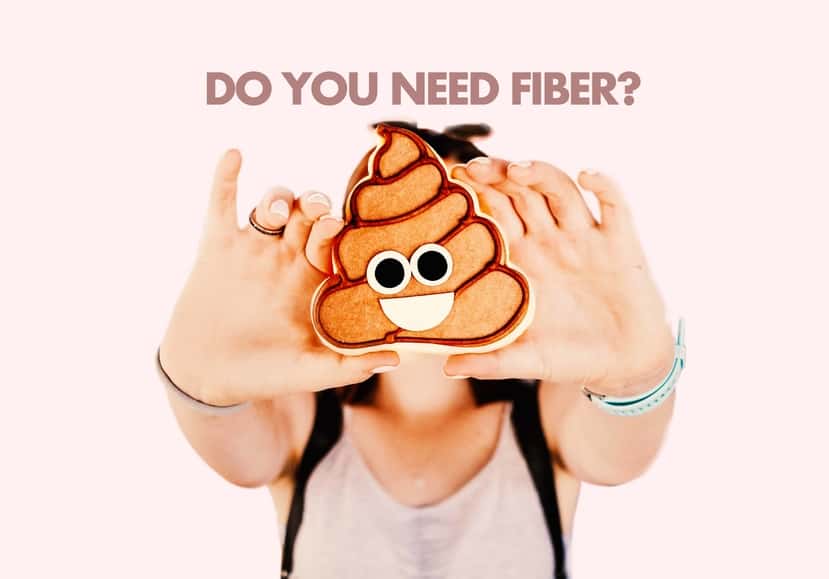Do You Need Fiber On The Carnivore Diet? (Why & Why Not?)

As an Amazon Associate we earn from qualifying purchases made on our website. If you make a purchase through links from this website, we may get a small share of the sale from Amazon and other similar affiliate programs. You can read our complete legal information for more details. By using this site, you agree the information contained here is for informational purposes only. For specific medical questions, consult your doctor. NO information on this site should be used to diagnose, treat, prevent or cure any disease or condition.

It’s no surprise that the carnivore diet doesn’t have fiber in it as it is completely devoid of plant food but it raises the question of whether you need fiber while on the diet or if you should use some kind of supplement. Surprisingly the answer is no!
In this post, we are going to cover the reasons why fiber is probably not required for good digestive health and overall well being. In fact, we are going to see how it can be unhealthy in certain circumstances.
First, What is Fiber?
Fiber is constructed of cells from plants that humans are unable to breakdown with their digestive enzymes. There are two types: insoluble and soluble.
Soluble fiber is found in fruits, veggies, legumes, oats, and oat bran. This kind of fiber absorbs water and usually slows down digestion.
Insoluble fiber is found in fruits with peels, veggies, whole grains, cereals, bran, stone-ground corn, and brown rice just to name a few. This fiber can speed up digestion. It’s basically sawdust.
Fiber is Good For You! Who Said That?
The food industrial complex, big pharma, and mainstream media, in general, has been slamming the idea down our throats that fiber is essential for good digestive function, gut health, and now our microbiome.
UCSF Health says, “a high-fiber diet appears to reduce the risk of developing various conditions, including heart disease, diabetes, diverticular disease, constipation and colon cancer.”
Furthermore, they say fiber is important for the health of the digestive system and for lowering cholesterol. Sure they resort to scientific studies but what a lot of people don’t realize is that these studies are based on epidemiology.
Epidemiology is a problem because it’s just food surveys given to people without specific factual data given back and they have what’s called a “healthy user bias.”
It’s easy to show people that have fiber in their diets as being healthy as they generally eat more veggies and fruits as compared to unhealthier foods like sugars and processed foods plus these people tend to not smoke, not drink alcohol, exercise more, and live in better conditions.
Dr. Georgia Ede destroys the idea of studies based on epidemiology in her post titled, “The Problem with Epidemiological Studies.”
Also take a look at who promotes the high fiber diet non stop. Companies heavy in the whole grains, such as Kelloggs, plaster this propaganda throughout their marketing campaigns.
Back in the early 1900s Will Keith Kellogg, the founder, created his cereal to help mitigate the urges for sex and masturbation. This same company also funds the so-called scientific studies to back up their claims and keeps the nutritional industries in check.
In reality, food nutrition science is lacking and over 85% of the so-called studies nutritionists use to support their recommendations are based on epidemiology.
We even have a Daily Recommended Allowance of fiber which states people between the ages 18-50 should consume 30-38 grams if you’re a man and 25 grams if you’re a woman. They also give a caloric guideline of 14 grams of fiber per 1,000 calories. Hmmm!
Dr. Shawn Baker Asks, “Is Fiber Overrated?”
First let’s take a look at the potential benefits of fiber based on current nutritional trends and advice from your standard health associations and practitioners.
Potential Benefit #1
Fiber is good for mitigating blood glucose increases. For instance if you drink apple juice, (a fiber less form of apples), your blood sugar will spike.
Now if you eat an apple your blood sugar doesn’t spike as much because that apple has fiber in it therefore fiber is able to mitigate blood glucose.
Potential Benefit #2
Fiber can potentially be used to effectively reduce weight gain as it is satiating. It’s a good use of filler as during your meals you feel full a lot quicker and thus eat less food.
Also because certain bacteria thrive on fiber it creates a fermentation process in the lower intestine and produces bloating and gas making you feel discomfort and less likely to eat more.
Who wants more bloating and gas?
Potential Benefit #3
Cholesterol is a hot topic and some studies have shown fiber to be able to reduce cholesterol. It’s such a small amount though that it doesn’t seem like a deal maker or breaker.
Also, cholesterol levels are highly debatable, and having low cholesterol doesn’t mean you are healthy and can mean the opposite….and I found low cholesterol is bad for your sex life which I documented in a crazy way here.
Potential Benefit #4
Fiber has been shown to reduce blood pressure but the amounts are so small that it doesn’t seem very useful, we are talking 1 or 2 points.
Big deal right? Worth it? Who knows.
Potential Benefit #5
The microbiome is such a hot topic right now as it is associated with mental health and overall well being. The idea is that your gut houses your microbiome and having more bacterial diversity is a benefit.
The problem is this is based on assumption and not fact. That’s where fiber comes in as certain bacteria thrive on fiber. People think that more fiber equals more good bacteria which equals better health.
Potential Benefit #6
Fiber is good for colon health as it helps with the production of a short-chain fatty acid called Butyrate. Butyrate is beneficial to colonocytes, cells within your colon.
Basically you can’t make butyrate without the fermentation of fiber in your gut but this is not absolutely true as people on a keto diet or carnivore diet that produce ketones are able to also produce another compound called hydroxybutyrate which is then converted into usable butyrate.
People on a high carb or Standard American Diet would therefore most likely need to keep fiber in their diets in order to get their butyrate.
Dr. Baker has written one of the top books on the carnivore diet, naturally called, “The Carnivore Diet”. I highly suggest adding it to your bookshelf.
If You Go Carnivore You Don’t Need Fiber
In reality, fiber is not essential to live and you could go your whole life without it. Is that healthy? Well, there are no long term scientific studies. But what can be said is that it’s not an essential nutrient.
Many people within the Carnivore Diet community have gone 2, 5, 20, 30, or 50 years without fiber and they are living perfectly healthy lives.
Don’t believe me? Then check out this Facebook Group “World Carnivore Tribe”. Here you will find numerous people that are on this diet and thriving from a digestive perspective.
Also take a look at some of the indigenous populations like the Inuit who have eaten an all-meat diet for generations, (aside from some berries in the summer), and they don’t have digestive complications. Also, they have a diverse microbiome which cancels the idea that in order to have a diverse microbiome you need fiber.
What about carnivorous mammals? Carnivorous mammals aren’t eating a whole lot of fruits and veggies but they have normal digestion and our digestive systems are more similar to them than say a cow.

What About Pooping Frequency?
Your general run of the mill nutritionist, vegetarian/vegan practitioner, or Westernized doctor is going to say something like, “you should be pooping at least three times per day…that’s an indicator of good digestive health.”
They also say eating meat makes you constipated but that’s not true either and brought up some compelling and funny reasons why that’s not the case in our post, “Does the Carnivore Diet Cause Constipation.” These people are full of it, literally and metaphorically.
They are pooping 3 times per day because they are eating so much fiber and that doesn’t equate to good health. Dr. Shawn Baker did a study on 100 carnivores and found the average poop per day was 1.2.
If you go carnivore and only poop once per day you are at normal range.
Why go only 1 time per day?
Meat is essentially the healthiest thing you can eat on the planet, the most bioavailable and the most absorbed by the body.
When eating all meat your body is just about absorbing everything and therefore you have less matter going out. When you go carnivore don’t feel weird about the 1 poop per day situation.
Fiber is Dangerously Unhealthy?
When you look at the big picture fiber is actually a nuisance to the digestive tract. It can cause and complicate constipation issues.
In fact, there was a study done, (not epidemiological), which showed fiber does not protect against diverticulosis, it actually increases the risk for it. Check out their study, “A High-Fiber Diet Does Not Protect Against Asymptomatic Diverticulosis.”
What Happens When You Go Carnivore And Eliminate Fiber?
Here are a few things to expect when you go carnivore. As stated above you are going to poop a lot less and in time you will most likely hit that 1.2 times per day statistic.
A lot of people may confuse not going with constipation but in reality, your body is absorbing and using all the nutrients from the meat. In the first few weeks or so you may also have steatorrhea, which is when your body isn’t able to or accustomed to absorbing fat. Over time you should normalize with normal stools.
Your microbiome will most likely change as well as bacteria associated with breaking down meat will overrun those that we’re accustomed to eating fiber.
Some of the other digestive benefits of eliminating fiber is that you will almost never be bloated and you will have a lot less gas, like almost never. It’s a very awesome phenomenon.
New carnivore dieters have reported not pooping for up to a week and this is usually the transition. Some people increase their electrolytes, add more fat, or include a daily teaspoon or more of magnesium to increase their bowel speeds.
During my first few months on a carnivore diet, I always had some magnesium in order to speed things up. Yet now I don’t even need it to feel “normal”.
These days, I do take it to replenish my electrolytes after working out.
For those wanting to speed things up, this is what I use: Natural Vitality Calm Magnesium Powder.

Of course there are some other supplements that will aid in digestion when going on a carnivore diet which I explain in this article:
Another well-known benefit is fewer poops equals less toilet paper and water therefore you are helping the environment. Just another reason to go carnivore!
However, if you feel discomfort or pain you should seek medical attention. In fact, talk to your doctor about any health and diet complications.
I actually ended up in the emergency room from a carnivore diet situation but it was from something completely different than what you would expect and I documented the story here, “How the Carnivore Diet Sent Me to the Emergency Room.”
If you are ready to go carnivore and need some motivation I would suggest heading to MeatRX.com. They are a great resource and have many testimonials.
Also, check our YouTube Channel Wild Lumens. Here you will find fun and informative videos based around the carnivore diet and wellness.
If you want more information from an experienced practitioner, then check out all the insane research I did on it here titled, “The Carnivore Diet 101: A Meaty Resource.”
Disclaimer: I’m not a doctor. Consult with and ask your doctor about any diet or medical-related questions. No information on this site should be used to diagnose, treat, prevent, or cure any disease or condition.



